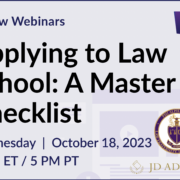Undergrad Action Plan: Junior And Senior Year
Undergrad Action Plan: Junior And Senior Year
Application deadlines are strict and inflexible. Even if you’re not close to missing the final application deadline, applying early can still mean the difference between admission and denial. It is critical that you have a clear plan when preparing to apply to law school.
In this post, we break down how to prepare to submit your applications in your junior and senior years.
Undergrad Action Plan: Junior And Senior Year
Keep in mind that this timeline is geared towards applicants intending to matriculate into law school directly after graduation. If you plan to take a few years off to work or pursue another graduate degree, the timeline is still relevant. Items listed in the “junior year” category can be shifted to senior year (if you’re still in school) or two years prior to your planned date of enrollment, whenever that might be. Items listed in the “senior year” are focused on the months before you plan to submit applications.
Undergrad Action Plan: Junior And Senior Year
Junior Year
- Attend law fairs and forums. In the fall months (usually from August through November), schools across the country host law fairs and forums. These events bring admissions officers from all over to one central location to help answer your questions and recruit students. It’s much easier to learn about a school by having a discussion with a representative than just doing your own independent research online. Admissions officers traveled across the country to speak with students. Use it to your advantage and get all of your questions answered in one afternoon during one of these events. Check out our tips for attending a law school fair and a list of questions to ask!
- Take on leadership roles in student organizations. Law schools are searching for high-achieving and well-rounded candidates for their incoming classes. This includes applicants who not only belong to student organizations on campus but take on leadership roles within those groups. In your freshman and sophomore year, you should explore what interest groups you might want to be a part of but in your junior and senior year you should get more involved in each. (Note: if you are working while going to school, don’t stress out too much about not being able to take on these extracurricular activities. Working displays many of the same attributes that you want to highlight through student org leadership, such as great time management skills, getting along well with others, and a strong work ethic.)
- Form relationships with professors. At the beginning of your junior year, you should focus on forming relationships with your professors, if you aren’t doing this already. This means that you should go to office hours, attend class prepared, and volunteer during class discussion. Feel free to share with professors your short- and long-term goals, including applying to law school. Lay the groundwork so that you can ask for a letter of recommendation later in the year.
- Maintain a high GPA. A high GPA is very important to remain competitive in the law school application process. Do not lose sight of this by getting involved in too many outside activities. Your junior year grades are your last chance to really boost your GPA as high as you can get it before applying for law school in the fall of your senior year. They are very important, and your classes should remain one of your top priorities throughout your junior and senior year!
- Begin LSAT preparation. Spend the winter months of your junior year preparing for the LSAT. Sign up for an LSAT prep course, buy self-study books, or start working with a tutor. This is the time to start seriously studying for the exam. We offer one-on-one LSAT tutoring with tutors who scored in the top 99th percentile on the LSAT to help you boost your score to where you want it to be.
- Sign up for an LSAT test. As you study for the LSAT, be sure to sign up for a test too. Registration opens months in advance of the exam and closes 6 weeks before the test. You only want to take the exam one time but always build in a backup test date just in case you did not do as well as you hoped the first time. Figure out the best time for you to take the LSAT.
- Ask professors and employers for letters of recommendation. In the late spring or summer, ask professors for letters of recommendation. If the professor is going on sabbatical or you are unsure of when you will see them in the fall, ask for the letter of recommendation before the spring semester concludes. If you plan to ask a current employer for a letter, you don’t need to be concerned with an end-of-semester deadline. Irrespective of who is writing your letter of recommendation, be sure to give the author plenty of time to write it. Share with them where you plan to apply to law school, when you want to submit your applications, and an updated copy of your resume that they can reference.
- Begin writing your personal statement. Your personal statement is one of the most important pieces of your application. For schools that do not conduct interviews, it is a candidate’s only opportunity to introduce who they are and why they are deserving of a spot in the incoming class. Check out our tips for brainstorming your personal statement. You should appreciate that this writing process is difficult and takes time. Do not save writing your personal statement for the last minute! For help brainstorming, drafting or editing your personal statement, just ask.
Senior Year
- Prepare to submit your applications this fall! Most schools release applications to candidates in August or September and begin accepting them in September or October. Almost all law schools employ “rolling admissions,” a process where schools begin to review and accept students as they receive their applications. Applying early is incredibly advantageous! Have all of your applications submitted throughout the fall if you can!
- Sign up for a second LSAT exam, if needed. You want to take the LSAT as few times as possible but if you didn’t get the score you were hoping for on an earlier exam, than a September or October LSAT offers you the chance to take it one more time without delaying your applications.
- Polish your personal statement. In the late summer and early fall months, you should be polishing your personal statement and optional essay. Have colleagues, attorneys, and other professionals review your statement for feedback. Be sure to keep in mind that this serves as your introduction to the admissions committee but also as a writing sample; it should be a reflection of your own work!
- Begin applying to law schools! After all of your documents are prepared, hit that “submit” button! Many schools have early decision deadlines in November and December. If you plan to utilize one of these, you can’t be late! For those applicants applying with the general population, aim to have all of your application submitted by December 31 or sooner!
- Don’t let your grades slip. Although your freshman, sophomore and junior year grades are what will appear on your transcript for review, it is very important that you not let your senior year grades slip. If you’re waitlisted at a school, they may want to see your fall grades as the determining factor for admission. Regardless, the school you plan to attend will require your transcript to be submitted to them upon graduation from undergrad and prior to matriculation into law school.
- Sign up for JD Advising’s Law School Prep Course in August! Your first year of law school is extremely important. Not only that, but the competition to be at the top is fierce. A high-quality law school prep course can help ease the pressure, lower anxiety, and give you the confidence that you are doing everything you need to be doing from day one law school. Our Law School Prep Course is designed by Ms. Ashley Heidemann who graduated as the #1 law student in her class of over 200 students In this course, she reveals the secrets were essential to her success in law school.
The bulk of your preparation will come in your junior year, but it’s important to start planning sooner than that. If you’re a freshman or sophomore in undergrad, don’t miss anything. Check out our undergrad action plan timeline geared specifically for freshman and sophomores!








Leave a Reply
Want to join the discussion?Feel free to contribute!